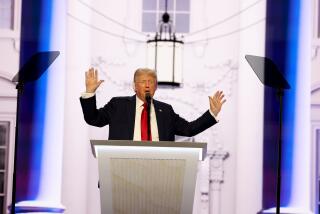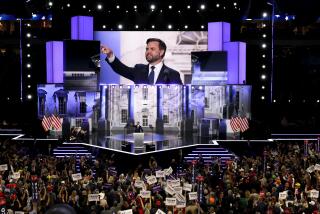Is There a Speaker in the House?
Do you remember a line, or even a phrase, from the speech given by a famous person at your college commencement? Do you even remember who that person was?
According to veterans in the ever-escalating commencement-speaker wars, it’s not likely that you do. Graduates and their families are too excited, too focused on the future, too filled with emotion to concentrate on the keynote speaker at the podium on graduation day.
Yet the search for the Perfect Speaker increases in competitive zeal each year. With more than 4,000 colleges and universities dotting the landscape, and more than 1 million graduates and families sitting through commencement exercises each year, schools must try ever-more valiantly to find the man or woman with a Golden Tongue. Someone to inspire, entertain, illuminate, ignite. Someone to impart blazing wisdom to graduates, while reassuring parents that their children (and their tuition fees) have gone to the right place. Someone whose prestigious name and accomplishments will inflate alumni with so much pride they rush to their checkbooks when the next college fund-raising letter arrives.
Schools crave speakers with something unforgettable to impart, leaving a lifetime impression on those lucky enough to have earned that chair in the sweltering sun.
Such speakers are, of course, almost impossible to come by. Not because they don’t exist, but because the very nature of the event makes even the most compelling orator seem irrelevant. After listening to course lectures for four undergraduate years, even the Sermon on the Mount might not win the graduates’ full attention, college officials say.
Yet from May through June of this year, schools across the country will showcase an amazing diversity of speakers. At more than 200 California campuses alone, the variety is astounding, from U.N. Secretary-General Kofi Annan at Stanford, to the Smothers Brothers at San Jose State. Speakers come from the worlds of film, TV, space, sports, politics, diplomacy, journalism, arts and letters.
A Varied List of Chosen Few
Journalists Cokie Roberts at Cal State Stanislaus and Judy Miller at Cal State Northridge; Voyager pilot Dick Rutan at Cal Poly Pomona; Disney chief Michael Eisner at USC; “Angela’s Ashes” author Frank McCourt at UCLA; science fiction author Ray Bradbury at Caltech in Pasadena; author Maya Angelou at UC San Diego; Congresswoman Mary Bono at Cal State Coachella Valley, to name a few.
Elsewhere around the nation speakers will include comedians Drew Carey and Bill Cosby, “The Simpsons” creator Matt Groening, actor Blair Underwood, musician John Mellencamp, Queen Noor of Jordan, Ted Turner, Sen. Edward M. Kennedy and Archbishop Desmond Tutu.
Do you see a pattern here? Of course not. With all these colleges and universities vying for “someone good” to speak each year, many schools will grab at any respected name they think they can nab--as long as they can afford that person’s speaking fee.
Speakers can be former graduates who have since become successful, or highly accomplished people who happen to have friendly ties with a particular faculty or board member of the school. Some schools get speakers through speakers’ bureaus, many of whom describe their dealings with colleges as “chaotic, frenetic and often last-minute.” Supplying commencement speakers has morphed into a specialty niche of its own, bureau representatives say--one that demands subtlety, diplomacy and sometimes guts, when they have to tell a college what it doesn’t want to hear.
“Colleges come to us with their wish lists: ‘Get us Steven Spielberg or Bill Gates, they say.’ Of course, that’s usually impossible, and not necessarily what they really need,” says Jay Callahan of the Keppler Associates speakers’ bureau in Arlington, Va. Callahan calls the commencement business “a whole different ball of wax. It’s unpredictable and crazy.”
There is sometimes little correlation between big fees and the excellence of the speaker or the speech, he says. Some luminaries who routinely make excellent commencement speeches, do so without requesting any fees. They simply feel good about doing it or are content to receive an honorary degree. Some who might charge top fees (which typically are as high as $100,000) will have little or no impact on the audience.
And some who would not be perceived as ideal speaking candidates make the biggest impact and get the best reviews from graduates, he says. His agency represents Carrie Kennedy Cuomo, Bobby Kennedy Jr., Ted Kennedy Jr., astronaut Jim Lovell, journalists Molly Ivins and William F. Buckley Jr., among others--almost all of whom are booked for commencements this year.
If there is a trend, Callahan says, it’s that colleges have started to respond to their students’ wishes for speeches that inspire, rather than irritate.
“For years and years, schools have brought in speakers with tremendous credentials, who spoke about weighty issues the students did not want to hear about on graduation day. It might have been prestigious for the school, but it was exhausting for the graduates,” he says.
At his own graduation from Boston College, he recalls, “it was 900 degrees, and this French woman was going on and on in broken English that none of us could understand.” It was memorable but in the most unpleasant way.
Speaker selection can be a source of controversy.
In 1999, at Evergreen State College in Olympia, Wash., many students walked out of the ceremony and others stood with backs turned to the podium to protest the inclusion in graduation ceremonies of Mumia Abu-Jamal--who was convicted of killing a police officer--through audiotaped remarks.
This year, a packed auditorium of graduates and their families at Antioch University in Ohio applauded audiotaped commencement remarks from Abu-Jamal. Nine people turned their backs, and one walked out.
In very rare cases, commencement speeches go better than anyone could have expected. TV journalist Maria Shriver says she fears public speaking (except in front of cameras) and immediately rejected the idea when a letter arrived two years ago asking her to address the graduating class at Holy Cross College in Worcester, Mass. In her new book, “Ten Things I Wish I’d Known Before I Went Out Into the Real World” (Warner Books), Shriver documents exactly how she got hooked into making the speech, despite her deep reluctance. The first letter, from the school’s president, reminded her that her brother had gone to Holy Cross, as had his wife; that both her parents had received honorary degrees from Holy Cross, as did her uncle, John F. Kennedy, while he was president of the United States.
But the letter proved unpersuasive, she writes. So the college president began to phone her relatives, asking them to intervene.
Family Started Putting on Pressure
“My brother phoned to lean on me. Yikes. Then my mother weighed in.” But still, she stalled for months, she says. “So Holy Cross went to Plan C.” They wrote to her again. This time, they said how disappointed they were that she was unable to commit, and that they would now find someone else to speak, ‘who would consider the request a great honor.’ ” That shamed her into submission, she writes. “Before I knew it, I was begging Holy Cross to let me give the commencement address.” She’s glad she did. It was so well-received that she developed it into the book.
Henry Rosovsky, former dean at Harvard University and eminent economist, says he ought to know a thing or two about lackluster commencement speeches. He’s listened to dozens of them, and “I’ve given quite a few of them myself,” he says. “Of course, you always hope to deliver an inspirational message that remains with students forever. In practice, this almost never happens. Their minds are elsewhere. The speeches are frequently filled with platitudes.”
In fact, Rosovsky says, commencement lore at Harvard includes the tale of an address given on June 5, 1947, by then-Secretary of State George C. Marshall. It was just after World War II. Europe was beset with poverty, famine and unemployment, making it ripe for a takeover by Communism. Marshall proposed a U.S.-sponsored plan to rehabilitate the continent and allow democracy to survive. The proposal, which was implemented as the Marshall Plan, worked beautifully. But Rosovsky says people still chuckle over the fact that most who heard the speech that day paid no attention to it--and it wasn’t until much later that they realized the famous Marshall Plan had been hatched right there at a commencement in Harvard Yard.
Jill Perry, a spokeswoman at Caltech, says there are lots of pitfalls colleges don’t think about, or couldn’t anticipate if they tried. There is the constant threat of cancellation, especially if it’s a politician booked in an election year. Certain kinds of journalists are high-cancellation risks too, she says, because a breaking news story could take them away at any time.
Perry also recalls some unexpected delights. Bob Newhart spoke at Loyola Marymount, where she worked in the mid-’90s.
“I recall one colleague who assumed he’d be boring to the kids because he was an older comedian and probably couldn’t relate. But the kids adored him; they ate it up. He was so funny, and he was able to talk the Loyola language, and talk about the Jesuits, because he knew all about it. He had gone to Loyola of Chicago.”
There are many ways to judge the capabilities of a speaker, she says. But every so often, colleges totally miss the boat. At her own graduation from Cal Poly San Luis Obispo, for example, the speaker was the top executive of a worldwide corporation.
“It was totally memorable” she says, “because the speech was so agonizingly, unendingly dull. He was one of those who said ‘I’ll keep this short,’ and then went on for an hour.”
Bettijane Levine can be reached at bettijane.levine@latimes.com.
More to Read
Sign up for Essential California
The most important California stories and recommendations in your inbox every morning.
You may occasionally receive promotional content from the Los Angeles Times.










